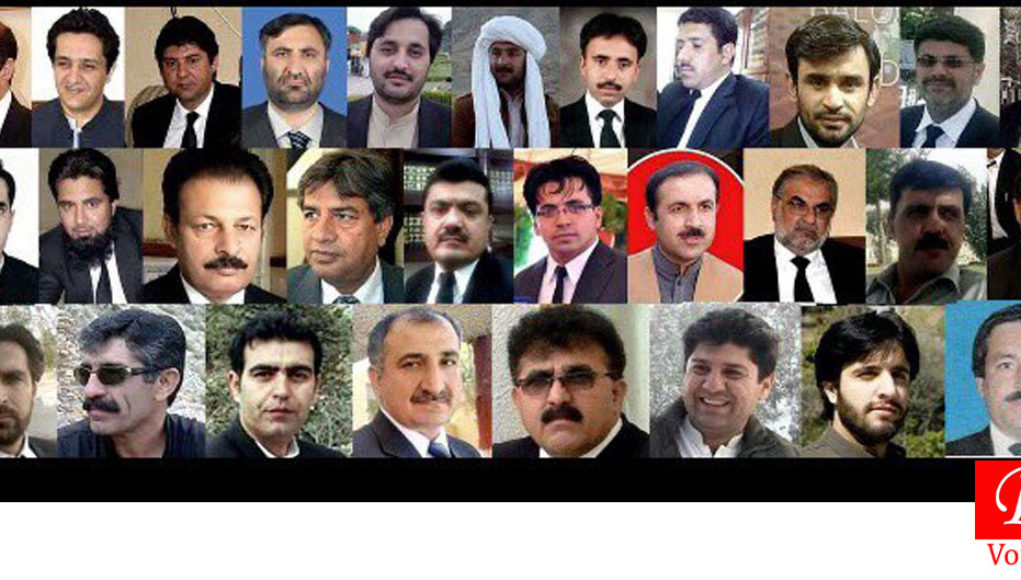 Fazal Ameen Kakar
Fazal Ameen Kakar
One year since, a suicide bomber struck at the gates of the Civil Hospital’s emergency department where a large number of people had gathered after his body was brought there.
At least 95 people died in the blast, and 100 were injured. Many of the dead included lawyers; several of them senior members of Quetta Bar Association Two cameramen from DawnNews and Aaj TV were also among the dead.
In June 2016, the principal of the University of Balochistan’s law college Aman ullah Achackzai was assassinated. On Aug 1, two Hazara men were shot dead. The next day, a lawyer was murdered in broad daylight by gunmen on a motorcycle. In response, pillion riding and the display of weapons in Quetta were banned. However, such cosmetic measures do little to thwart those bent on carnage.
Read also: Loss of Senior Lawyers: Balochistan Might Not Get Quality Judges for Next 25 Years
While the immediate target may well have been the legal community, with the murder of Bilal Anwar Kasi acting as ‘bait’, there is little to illuminate the motive behind the atrocity.
Moreover, lawyers, doctors and teachers are seen as part of the ‘intelligentsia’, and when they are targeted — especially through such wholesale slaughter — it casts a pall of gloom over society, especially in a province that has seen a heartbreaking decimation of its educated class through violence.
What Judicial Commission Found
A one-man judicial commission investigating the August 8 deadly terrorist attack in Quetta points out ‘monumental failure’ of the interior ministry to combat terrorism. It says the ‘irresponsible’ post-attack statements of Balochistan’s chief minister and home minister undermined the credibility of the provincial government.
The damning report, made public by the Supreme Court on Thursday 15 December 2016, has been compiled by Justice Qazi Faez Isa of the Supreme Court. The judicial commission was tasked to investigate the deadly gun attack on Bilal Anwar Kasi, the president of Balochistan Bar Association, and the subsequent suicide bombing at Quetta’s Civil Hospital in which 95 people, mostly lawyers, were killed.
The commission worked for 56 days to examine concerned persons and obtain responses from all relevant ministries, departments and institutions. It has concluded that the gun and suicide attacks were inextricably linked and were carried out by the same group.
Read also: Editorial: 40 Days After the Quetta Carnage
According to the commission, the Balochistan government’s credibility was undermined after the attacks as the chief minister, the home minister, and their spokesman had made irresponsible press statements. “In these statements, fabricated leads were broadcast, disrupting the investigation and creating false expectations,” it states.
The report says the investigators think that there is some connection between the attackers and their handlers in Afghanistan. However, neither the gun attack on Kasi nor the subsequent attack by the suicide bomber could have been possible without local assistance and participation. “The suicide bomber was a Pakistani national and so too were a number of his accomplices.”
The commission also points to the Ministry of Interior’s ‘monumental failure’ to combat terrorism and perform basic protocols. The ministry was without a clear leadership and direction and was confused about its role in combating terrorism.
The report highlights the interior ministry’s reluctance to take action against terror outfits and delays on its parts to proscribe militant outfits. “Proscribed organizations continue their illegal activities and new terrorist organizations are proscribed after long delays. Some terrorist organizations have still not been proscribed or prosecuted, even when their statements acknowledging terrorist attacks are broadcast and printed.
It says the Balochistan government had written a letter to the ministry on August 16, 2016 to proscribe Lashkar-e-Jhangvi Al Aalmi as it referred to five specific FIRs that recorded the group’s crimes, including murder of policemen and Frontier Corps personnel. However, the interior ministry neither responded to the letter nor banned the organization.
It observes that the Interior Minister, Chaudhry Nisar Ali Khan, displayed little sense of ministerial responsibility as he only called one meeting of the executive committee of the National Counter Terrorism Authority (NACTA) in over three-and-a-half years.
On November 4, 2016, the commission wrote a letter (No 036) to Nisar, asking him a number of questions, including, “Why was ASWJ [Ahle Sunnat Wal Jamaat] permitted to hold a public meeting?
The commission has recommended that the Anti-Terrorism Act be enforced and terrorists and terror outfits must be proscribed without delay. They must not be permitted to hold meetings. Those claiming to be members of the proscribed organizations should be prosecuted in accordance with the ATA.
The report says there is a breakdown in the implementation of law and order, which has led to rules being repeatedly violated without consequences, and this has fostered a culture of nepotism.
“There are unabashedly clear instances of nepotism when unqualified individuals were illegally appointed. This includes the illegal appointments of at least four secretaries, including the secretary health department, who is brother of a retired Lt Gen and federal minister.
Observation on NAP
The commission has found that the National Action Plan (NAP) is not a plan in any structured or meaningful way, nor has its goals been monitored or implemented and that the ATA has been violated.
“The National Action Plan should be made into a proper plan, with clear goals, a comprehensive monitoring mechanism, and periodic reviewing. It should also be translated into Urdu for wider dissemination and understanding,” it said.
Read also: Sorry, I couldn’t do anything or you
The commission says the country’s western borders are not monitored, and even from the official crossings there is a free and unrestricted flow of people and goods, including terrorists, weapons, ammunition, and other contraband.
It says that the Ministry of Religious Affairs and Inter-Faith Harmony is a moribund ministry and is not fulfilling its most basic mandate for interfaith harmony. There is no registration or monitoring of madrassas.
The commission says that the media has a very few stories about the victims of terrorism. Media coverage seems to be centered on the propaganda of terrorists, which is disseminated in breach of Section 11W of the ATA. The commission has recommended that if the media broadcasts and propagates the views of terrorists, then those doing so must be prosecuted in accordance with the law.
Writer is Native of Zhob Balochistan and a Graduate from the University of Punjab.
Disclaimer: Views expressed in this article are those of the author and Balochistan Voices not necessarily agrees with them.
Share your comments!








